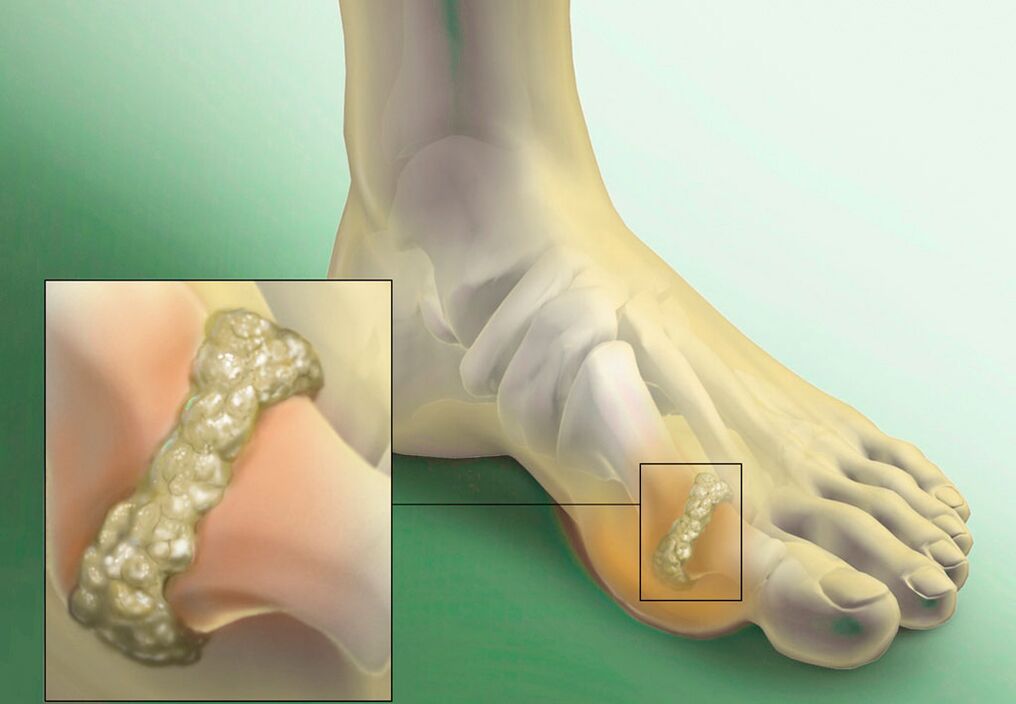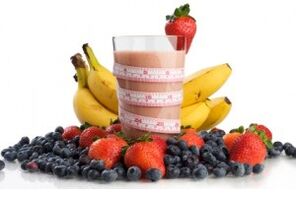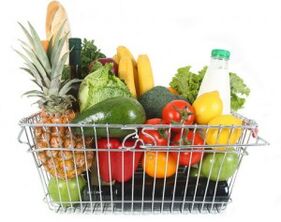The modern world is full of all kinds of gourmet temptations. Every step we take, we will come across shops with bars, French fries, bread, pies, and other things. These things look delicious, but sooner or later they will cause stomach and digestive disorders.
In ancient times, when this disease occurred, the patient did not know the treatment method and led a normal life, which aggravated the condition and eventually led to disastrous and sometimes fatal consequences.
There are many treatment options for gastrointestinal and gastrointestinal diseases. But for their successful treatment, you need to limit yourself and completely modify your daily diet.
What is gout?

Gout is a disease directly related to human diseases. For gout, the salt from uric acid will remain in the joint tissues, which can lead to very serious consequences. Gout was first mentioned in the time when Hippocrates lived, and there have been many manifestations since then.
Fortunately, the disease is less common nowadays, with about 3 cases per 1, 000 people, although outbreaks of the disease have become more frequent in recent years.
This increase in the incidence of this disease is related to the food and quantity people eat.
Initially, a sharp increase in the concentration of uric acid in the human blood can cause the disease. Derivatives of this concentration pass through the body with the help of blood and are deposited in joints, muscles and even organs. This deposit is dangerous because the infected tissue may be destroyed. This increase in acid concentration is due to the kidneys having no time to process and excrete excess products from the body. In addition, the problem may be caused by kidney disease and dysfunction.
The initial symptoms of this disease are joint pain, redness of the big toe and fever. It is important to note that if you do not go to the doctor when symptoms appear, and the condition is delayed, the affected joints will be completely destroyed, which will lead to disability. If the organs are destroyed, persistent pain and death are possible. This is why it is necessary to take this disease as seriously as possible.
The manifestation of gout depends directly on what a person eats, what they eat, and how they live. It is not unreasonable that gout was previously called the "king's disease", because an inactive lifestyle, frequent consumption of high-fat, high-calorie foods, and excessive consumption of alcoholic beverages all lead to metabolic problems, leading to similar diseases. Therefore, in the treatment of gout, strict adherence to a proper diet and a diet that reduces acid production are considered very important, even the main points. To find out the level of uric acid in your blood, you only need to donate blood for analysis.
How to eat it?

The particularity of formulating a diet for gout patients aims to restore the metabolism of uric acid in the body. If you do not take emergency measures to restore this level, excess acid (sodium urate) will be adjusted everywhere in the body, causing widespread inflammation.
In addition to setting the necessary diet, the doctor recommends receiving medication and insisting on physical therapy. In addition, it is recommended that gout patients live a more active lifestyle, walk more and breathe fresh air.
When it comes to diet, it should be pointed out that a necessary step is to exclude some taboo foods from the diet. When the condition worsens, it is impossible to eat fish and meat. It is imperative to arrange fasting days at least twice a week, preferably every other day.
The number of fasting days for gout patients is:
- fruits and vegetables. You need to eat one and a half kilograms of fruit every day, which is allowed by the diet.
- Milk and kefir. In this case, the patient must drink up to two liters of this liquid per day.
- Curd and kefir. It is necessary to eat 400 grams of cheese and drink half a liter of kefir.
Such fasting days are useful because they help dissolve and remove uric acid from the body. When the condition gets worse, the patient can continue to eat fish, but strictly steam, boil or roast. It’s worth remembering that you need to eat these products up to 3 times a week, and don’t eat them often.
It is necessary to adhere to the correct water system. You need to drink about three liters of clean water every day. During the worsening of the disease, you need to drink it one hour before meals. If it does not deteriorate, you can replace the water with another liquid, mainly because it is natural and fresh. You can also drink alkaline mineral water.
Gout patients are fasting. In this case, the gastric acid level will rise sharply. It is best to eat less, but often.
Recommended menu for gout
For gout, you need to eat natural and healthy foods. From these products, you can make a daily menu, but you should consult your doctor about their dosage, because everyone's diet may vary from person to person.
Acceptable product list:
- Meat products: turkey, rabbit, chicken; eggs.
- Lean fish; seafood: squid, shrimp.
- Cereals: wheat groats, oatmeal, millet, rice, buckwheat.
- Pasta; black and white bread.
- Vegetables: cabbage, zucchini, eggplant, cucumber, beet, potato, carrot.
- Onion, garlic, dill.
- Fruits: citrus fruits, apples, pears, apricots, melons and watermelons, peaches.
- Berries: Everything is possible, except grapes and raspberries; dried fruits other than raisins; nuts.
- Sweet: non-chocolate, candy, jam, jam, marshmallow, honey.
- Natural drinks: fruit juice, fruit drink, fruit drink, kvass, lemon, rose hip or bran soup for one hour.
- The first dish does not contain broth and olive oil; the second dish is boiled or steamed.

You can eat other foods, but in small amounts, such as boiled sausages, bacon, and sausages. You can eat about two tomatoes and plums a day, about twice a week.
Salt should be completely eliminated or its use should be significantly restricted. It is best to cook the food without adding salt at all, and add some salt to the dishes already prepared on the table. Of course, kimchi, kimchi and most spices should be eliminated from the diet.
It is recommended to reduce the intake of protein foods (especially red meat), because the accelerated metabolism of protein will cause an increase in the concentration of urate. If you are overweight, you should also limit carbohydrate foods (especially baked goods, pastries).
Honey and figs, plums, grapes, certain types of vegetables and root crops (radishes, celery, rhubarb, cauliflower, pepper), and mushrooms should only be included in your diet during remission.
Otherwise, you need to consult a doctor, who will prescribe a more detailed diet for a certain degree of disease.





















